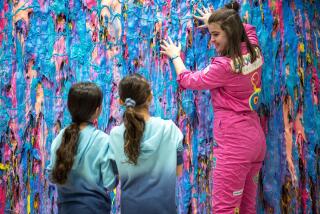All Fun and Games : But Slime, Ice Cream Experiments and Camps Are Educational Too
- Share via
Want to get slimed? Try the Discovery Science Center.
That’s where kids will learn to make--if not hurl--slippery substances during an annual summer camp, one of several educational programs the center plans for children and adults.
The five-day camps, modeled after those originated at the Launch Pad--the center’s satellite location at Crystal Court mall--will keep kids 6-12 busy from 9 a.m.-3 p.m. Each day will be devoted to a different topic, from flight to forensic science, and include interaction with exhibits, staff demonstrations and hands-on activities, slime-creation among them.
Friday or Saturday sleepovers are bound to be another popular learning tool, especially for children fond of cold desserts. Before slipping into a sleeping bag for the night--next to any exhibit in sight--they’ll be shown how to make ice cream with liquid nitrogen, the very chilly, totally nontoxic natural element.
Old-fashioned field trips for schools, girls and boys clubs and other community groups form the foundation of the center’s educational efforts, of course. Already, more than 13,000 K-12 students, most from Orange County, have been signed up, according to Janet Yamaguchi, the facility’s education coordinator.
It’s expected that each year, about one-fifth of all these trips will be free, Yamaguchi said, through support from such philanthropic organizations as the Keck Foundation, which has donated $160,000 to the cause.
Multilingual Approach
All labels explaining center exhibits will be printed in English only, but they’ll be translated into Spanish and available in booklet form, hopefully by spring, Yamaguchi said. Audiotaped gallery guides recorded in Spanish and Japanese will be ready on opening day, she said, and gallery aides who can speak English, Spanish and possibly Vietnamese will be hired in the months ahead.
Center staffers also will take science into the classroom through a variety of outreach programs. The Starlab, for instance, is a portable planetarium of sorts, an inflatable 18-by-25-foot dome inside which students will learn about the heavens via ceiling projections of the stars and constellations.
And for the facility’s smallest visitors? They might enjoy hearing a science-related book read aloud in the KidStation, a space reserved for children 5 and younger that’s designed to look like mission control.
Besides lectures by prominent scientists, Yamaguchi has something unusual cooked up for adults. She hopes to initiate a food- and beverage-related “Meet Me at Six” event. The idea: a dissertation about the chemistry of beer, perhaps, and a hands-on demo about how to make it.
Now, that beats getting slimed.
Call the center for reservations or for more information, (714) 542-2823. Some activities will be included with admission; others will vary in cost from $3.50 per student for the Starlab to $135 per child for summer camp. Initially, during a test period, sleepovers will be offered only to Boy and Girl Scout troops.


